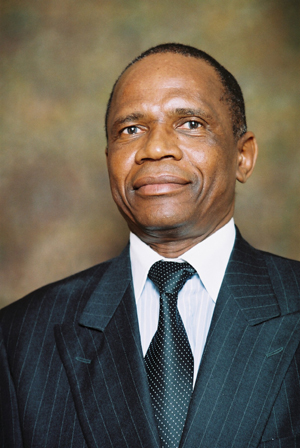Latest News Archive
Please select Category, Year, and then Month to display items
06 April 2018
Photo Rulanzen Martin
 From the left: Dr Thulisile Mphambukeli, leader of the BRICS research team that is exploring the political economy of water and food security, and her research partner, Dr Victor Okorie.
From the left: Dr Thulisile Mphambukeli, leader of the BRICS research team that is exploring the political economy of water and food security, and her research partner, Dr Victor Okorie.
A Brazil, Russia, India, China and South Africa (BRICS) delegation is to hold the 10th Annual BRICS Summit in the last week of May 2018 in Johannesburg. Dr Thulisile Mphambukeli, leader of the University of the Free State (UFS) research team alongside Dr Victor Okorie from the Department of Urban and Regional Planning, in collaboration with Prof Lere Amusan of North-West University, will ensure that water and food security is a prominent feature on the gathering’s agenda.
First, the project titled: “Exploring the political economy of water and food security nexus in BRICS and Africa” will debut at the National Institute for the Humanities and Social Sciences BRICS Think Tank Forum”.
According to Dr Mphambukeli, the key to water security is attitudinal change by means of education and conscientisation. This, she is adamant about, holds the potential to drive behavioural adjustments in the way society interacts with water.
Genetic and social approaches
Dr Okorie asserts that if strides towards reducing the demand for water were to be made, research efforts should be geared towards effecting changes at DNA level. Meaning we need to explore waterwise ways that enable crops and animals to thrive optimally.
The project also looks at social dimensions of water such as flushing a toilet. “Research activities on redesigning toilets, especially the urinal, where more than nine litres of water are used to flush less than one cubic centimetre of urine, are timely in the context of managing water and the food nexus crises,” said Dr Okorie.
Combining the genetic and social approaches would allow us to produce more with a smaller water footprint. This can be made possible by implementing precision agriculture which is about estimating and applying exact quantities of water and nutrients needed for the production of crops or the raising of livestock.
Paradigm shifting policies
Prof Amusan said the team intended to propose functional solutions that take the quality of water into consideration. Equitable production and distribution of water depends on endorsing policies of co-production between citizens, governments and the public sector. BRICS member states mutually consider water and food security as an issue of paramount significance, hence its feature on this prestigious summit’s agenda.
UFS holds memorial service for Prof Benito Khotseng
2015-01-09

Prof Benito Khotseng |
The management of the University of the Free State is saddened by the passing away of Prof Benito Khotseng, former Vice-Rector: Student Affairs at the UFS.
Prof Khotseng died from a heart disease on Sunday 4 January 2015 at the age of 67.
He joined the University of the Free State as a senior manager more than two decades ago.
According to family and colleagues, his death has left a void in the education fraternity.
Prof Kalie Strydom, who has been a colleague of Prof Khotseng for more than 20 years, described him as a principled leader who did not promote and argue educational issues in his own interest.
“His focus was never on benefitting opportunistically in the short term, whether professionally or financially. I had the privilege of participating with Benito in many meetings and fundraising efforts where the correct values/principles and the organisations/institutions for which he worked benefitted, but other than so often happens in life, Benito did not benefit personally. We celebrate him forever, though with tears in our eyes.”
A memorial service for Prof Khotseng will be held at the UFS’s Bloemfontein Campus:
Monday 12 January 2015
10:00
Albert Wessels Auditorium, Bloemfontein Campus, UFS